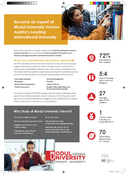Doctorate in Business and Socioeconomic Sciences
Sustainable Tourism and Sustainability of Tourism
Increasingly businesses are facing disruptive forces such as financial recession, natural and civil disasters, scarcity of resources and global warming, accelerated pace of technological innovations, globalization and changing consumer demand which puts them into challenging positions to finding ways how to deal with these changes. At the Department of Tourism and Service Management we aim to address these challenges by tackling those forces from a tourism and services business perspective in order to develop a better understanding what is needed for balancing the needs of ‘people, planet and profits’ and for ensuring responsible and sustainable management and operations practices in the tourism industry. The main research fields in this area are:
- Technological advancements, growth in mobile use and increased connectivity have changed the way of communication for businesses and travellers and are drivers for innovations. Research on electronic marketing, eWOM in travel and tourism, evaluating website functionality and measuring website quality, open and user-driven innovation for tourism products and services are core research activities in this area.
- Resource constraints, the impact of climate change and social and economic inequality will affect and threaten the tourism industry if not managed responsibly.
As particularly technologically oriented, geotagging and user tracking for destination development and marketing may be investigated, and the options of forecasting tourism demand in the era of Social Media.
In order to create a better understanding of these threats, the Department of Tourism and Service Management aims to identify these impacts and to develop measurement methods which allow to report these impacts with clear indicators in a transparent way. Special focus within corporate social responsibility is given to the needs of employees and their well-being, business ethics, the emerging concept of social entrepreneurship, impact measurement of social responsibility as well as the evaluation and assessment of sustainable tourist transport systems including forms of slow tourism.
Digital Consumers and Service Innovation: Technology for transactions with clients, information for consumers and a tool to store experiences in the form of pictures on the mobile phone have become reality. Businesses need to increasingly understand how to leverage technology to maintain a competitive edge and they need to continuously re-invent themselves.
Given those trends there are four streams of research eminent: A) To create memorable service/tourist/customer experiences it is important to understand the customers’ needs and match them with firms’ capabilities. Even more so, it is important to understand the whole customer journey and find innovative ways to create and design such consumption experiences. There is still a lack of research regarding experience design, design for service innovations that is also taking service failure into account. B) Technology is widely used before a service encounter/trip to search for information, to book, do reservations and the like. Also after a trip or service encounter customers tend to provide feedback about their experience and do reviews. However, there still needs to be research done to understand technology use during the trip and even more importantly to understand how technology impacts the experiences customers/tourists make. C) The wealth of online user generated content hints at the potential of tourist/user driven innovation in a service setting. Typically innovations in services are less radical and less frequent, therefore, open innovation might be a fantastic tool to stimulate innovation in the services sector. There is still a lack of research to understand innovation in a value creation network such as tourism. D) Content consumption and production can now be done by service providers but also by individuals through blogs, snapchat, youtube etc. There is still a lack of research regarding the effectiveness of peer to peer created marketing activities.





